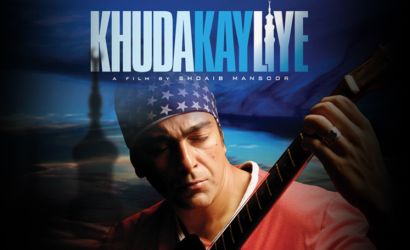
The movie attempts to take on the raging debates consuming the Muslim World and Muslims living in foreign lands. The plot starts somewhere in pre 9/11 timeframe and ends in late 2002 in the midst of which it follows various characters facing an array of issues in life. Racial Profiling, Forced Marriage, youth radicalisation, identity crisis for British and American Muslims, Muslim women marrying men of other or no faith, and Music.
The movie revolves around two musician brothers - Mansoor and Sarmad - one of whom transitions into "religious extremism" and the other falls victim to American Intelligence agencies and subsequently tortured.
It depicts an upper middle class/rich family in Lahore with a mix of traditional and liberal values. The brothers have their own music group and are shown as beginning to make a mark on the music scene in Pakistan. The younger brother (Sarmad) gets involved in an extremist company whereas the elder brother (Mansoor) moves to Chicago to attend a music school.
Two more angles enter the movie where Mansoor gets into a romantic relationship in Chicago and eventually marries a white American and Sarmad deceitfully marries his British born and raised cousin. In the latter case, the UK based uncle of the boys, worried by the prospect of his daughter having an affair with a white British, traps her into a visit to Pakistan and sends her into an Afghan village where she is forcefully married.
The movie moves into post 9/11 territory when Mansoor is picked up by law enforcement agencies in the middle of the night from his apartment and detained ostensibly in an extra constitutional prison and humiliated in all ways. Sarmad on the other hand gets involved in the battle between Taliban, US forces and Northern Alliance.
Despite covering a range of serious topics, the film circled around a predictable message which the producers of the movie wished to give as a take home message to the audience. "In the name of God" forces in Pakistan are attempting to swing the country on religious lines, hampering progress, modernity and standing in the international arena through "rigid" interpretations of Islamic Text. On the other hand, Western states in their blind rage of "combating" terrorism are locking up, detaining and torturing Muslims.
The producers and Director of the film make it clear that aggression against Muslims around the world does not necessarily translate to supporting Islamic causes and must be kept separate. Hence the films predictable messages begin opening up as they champion the cause for a secular set up for Pakistan where Islam is left to personal rituals and discussion on morals and arts architecture.
The Islamic parties in Pakistan have actually failed to put forward any credible thoughts forward for the future of Pakistan and as the film depicts are aimless in any real vision for the nation. On the contrary, surely the producers and Directors are not oblivious to the damages secular principles have bought to those countries where it has been championed?
So is the film about if music is halal or haram or more to do with modeling Muslim countries on failed concepts like Secularism- examples of which are Turkey where the Hijab is banned, where the army rejects entry of any person with Islamic traits, where bikinis are considered normal summer wear and youth are more mindful of MTV than devoting energies to the deen of Allah (swt).
Salam,
ReplyDeleteI just watched this last night. I have to admit that I was impressed with the quality of the film coming from Pakistan. It had me engaged through-out.
As for the message, I had mixed feelings. Every person in the movie makes mistakes. However, I was not happy that the film attracts sympothy with the westernized characters (eg Mansoor & Mary) and anger towards the religious characters (eg the molvy and Sarmad's friend). This effect is not going to help Islam's cause.
Having said this it was not completely biased and there was a reasonable attempt to portray a balanced view, but not as much as I would've liked.
Would you agree?
As salaam aleikum,
ReplyDeleteI just finished watching the movie and immediately googled to check reviews of the movie. I have to admit the quality of movie was indeed impressive, i was really taken by the serious dialogs of the moulvi - his character was very very strong and there was too much gravity in his voice and words. He chose his wordings very wisely.
I still cannot conclude for myself whether it would be permissible to forcefully put a girl into marriage over letting her marry into non-muslims. It certainly is against islam to have not taken the consent of the girl for her marriage.
I did not understand why Naseeruddin shah - another moulvi was listening to music! when the movie already gave the message that music is haraam. Was he a modern moulvi? It doesn't make sense to me. It is not extremism to not listen to music. Also, after having being convinced himself, Sarmad starts to sing again in the end. Did he like all of a sudden forget what he was taught or did he come to believe that its was extremism.
I really hope that people who call themselves muslims come to realize how much of islam do they actually know and how much do they practice.